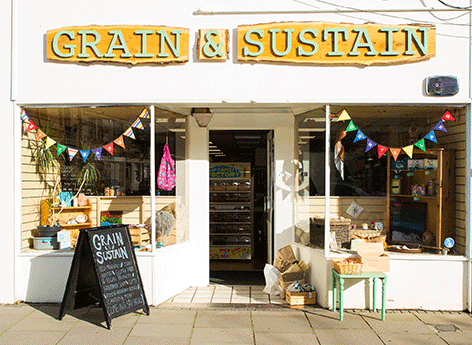We hear the phrase ‘people and planet before profit’ a lot within the green and ethical sector. But is it just marketing or are there important principles that sit behind this catchy strapline?
In 2019 I set up my first zero waste store, Grain & Sustain, just outside Edinburgh. I wanted to highlight the importance of understanding the connection between human rights and environmental sustainability, while providing premium quality products as accessibly as possible.
However, I was aware of the perception that refill shops can be seen as more expensive and so I knew that if my fledgling business was going to succeed, I would have to take our customers on a learning journey with me. Things like food and fashion are not cheap to produce. So, where these items are being sold at a rock bottom cost, someone, somewhere is paying the price through poor working conditions and low wages.
Take cashews for example. A single nut is borne from a single fruit, which makes it hugely labour intensive to harvest. Cashews also contain cardol and anacardic acid between the two outer layers of shell. Factories that fail to provide gloves expose the many women who work in the industry to permanent damage when the liquid corrodes their hands. If you are wondering why a particular product appears to cost more than the supermarket, don’t be afraid to ask!

We have become sanitised from the impact of our choices because we don’t experience the day-to-day effects that climate change and environmentally damaging practices are having, while marginalised and vulnerable communities disproportionately bear the brunt of our lifestyle.
There is also a false economy with cheap food and fashion. Lower nutritional values require us to eat more, leading to overconsumption. Poor quality clothes and electrical goods wear out or break quickly more quickly and therefore need replacing more frequently. However, it is a privilege to be able to afford higher priced food and other items, and so we have got to find ways to address the sustainability of production without being exclusive. The journey to zero waste shouldn’t be elitist, and we need to encourage a wider diversity of voices into the green/ethical space.
I was shocked at just how cheaply the supermarkets were selling some products compared to the trade prices that I could obtain. Traditional supermarkets do have greater buying power. However, the way that many suppliers are squeezed on price directly impacts the people behind it.
Like most zero waste stores, at Grain & Sustain we work hard to offer value for money while still balancing the books. So, we price match where we can taking into account the higher quality of our products. We recognise the importance of being commercially viable without being purely profit driven. Ensuring that everyone along the supply chain is treated fairly, means that ethical businesses need to sell proportionately more in order to make a profit. That doesn’t make us bad at business, it makes us good in business.
By supporting your local refill shop you amplify those principles and help us to normalise this transformative way of shopping.















I think there is a big deception going on in the falsely bucolic images with which supermarkets advertise their food. I’m sure many city dwellers believe their milk comes from individually named cows milked by rosy checked lasses, and such like.
Alisonjane – you mean it doesn’t? How sad!
Yes, big deception indeed! The fictitious farm names such as ‘Boswell Farm’ and ‘Woodside Farm’ used to brand supermarket own-label fruit, veg and meat were challenged back in 2016 as being misleading by the Soil Association and NFU, who rightly claimed this type of labelling led consumers to believe they were buying products from real farms in the UK.
Dear Louise,
Could you please open a shop in London?
Maybe I’m a sucker, but when on holiday in Totnes some years ago, and I found Earth Food Love I loved it. Buying foods and good quality, without any packaging, particularly plastic was great. Major supermarkets are nowhere at the moment and although their plastic covered offerings are perhaps a few pence cheaper, I would rather give my money to a shop where I could get food without a load of plastic which we as a nation pay the price of disposal. I suppose supermarkets will drag their feet until they start to see their profits affected, then perhaps they will do something?
The independents have really led the way on this and serve local communities so well, especially compared with the outdated model of overpackaged goods and ‘fast retail’ that supermarkets are still sticking to.
There are some in different parts of London. I know of one in Hackney. and Winchmore Hill. The chain Planet Organic have some. I’m sure there must be others. Hope this helps.